Sudanese NHS doctor finally allowed to return to UKpublished at 01:45 BST 29 April 2023
He has now been evacuated from Khartoum, after first being turned away because UK nationals were the priority.
Read MoreThis is an automated feed overnight and at weekends
He has now been evacuated from Khartoum, after first being turned away because UK nationals were the priority.
Read MoreThe Atabani family tell the BBC that thousands are stuck at the border as the cost to cross soars.
Read MoreFlorent Ibenge, in charge of the country's leading club, hopes to be reunited with his players soon.
Read MoreWe're back again on Tuesday morning
That's all from BBC Africa Live for this week. Because of the holiday on 1 May, we'll be back on Tuesday at bbc.com/africalive.
In the meantime you can get the latest news from Sudan, and the rest of the continent, on the BBC News website and our Africa Today podcast.
Here's a reminder of Friday's wise words:
Quote MessageThat truth that can ruin a marriage, leave it unsaid. "
A Krio proverb sent by Tommy Francis Alpha in Freetown, Sierra Leone
Click here to send us your African proverbs.
And we leave you this photo from Niger - it's one of our favourites this week:
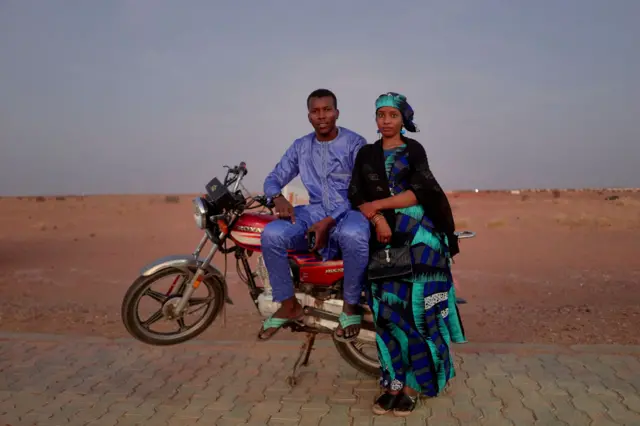 Image source, AFP
Image source, AFP Shingai Nyoka
Shingai Nyoka
BBC News, Harare
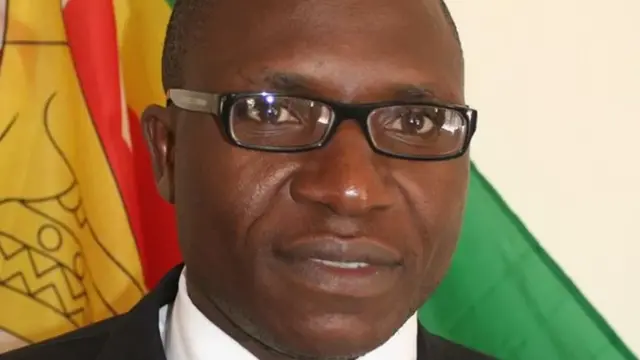 Image source, JACOB NGARIVHUME/FACEBOOK
Image source, JACOB NGARIVHUME/FACEBOOKJacob Ngarivhume and others took part in the anti-government protests
A Harare magistrate has jailed the leader of a small opposition party for his role in calling for anti-government protests three years ago.
Jacob Ngarivhume of the Transform Zimbabwe was sentenced to four years in jail with 12 months suspended. Magistrate Feresi Chakanyanya said a fine or suspended sentence would have trivialised the offence of inciting the public to commit violence.
Ngarivhume was arrested in July 2020 for calling for protests against corruption and deepening economic woes.
Police banned the protests citing coronavirus restrictions and arrested several government critics - including internationally acclaimed author Tsitsi Dangarembga for holding up protest placards on the roadside in her neighbourhood.
Earlier this year, Dangarembga was found guilty of inciting violence, but given the option of a fine.
Ngarivhume will appeal against both his conviction and sentence.
The Zimbabwe government has been accused of using the law to suppress freedom of speech in the country.
 Catherine Byaruhanga
Catherine Byaruhanga
BBC News
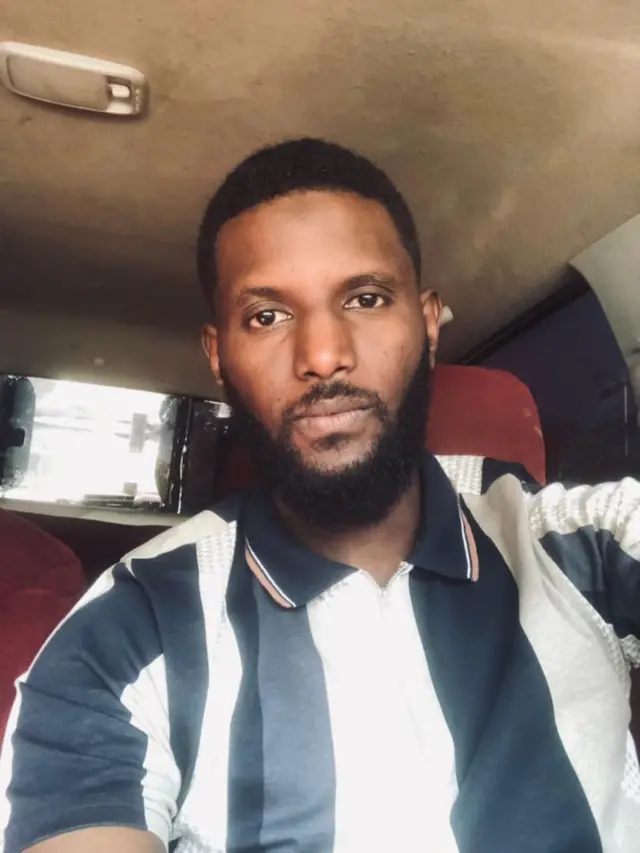 Image source, Courtesy of Bashir Hassan
Image source, Courtesy of Bashir HassanAid agencies are warning that a humanitarian disaster is unfolding across Sudan following nearly two weeks of fighting between the country's army and the powerful Rapid Support Forces paramilitary group.
"We don't have food, We don't have any pharmacies. We don’t have anything, so we go to another area to bring food or water," 30-year-old Bashir Hassan tells me over the phone.
He has become a lifeline for his family and community in Bahri, north of the capital Khartoum. Together with other men in the area, he drives to the River Nile every day to collect huge buckets filled with water that he distributes.
"We don't have water for like 15 days now since the beginning of the war. No water. I go to the Nile to bring water and come back."
He tells me that even though the media has been filled with stories about people leaving the country - both foreigners and Sudanese themselves - the majority of people are staying in their homes or going to safer parts of the country.
On Friday, the UN's refugee agency warned that 'the conflict is having a devastating impact on the civilian population, including refugees and internally displaced people across the country".
Fuel scarcity means Bashir is struggling to make his trips to collect water. On Friday morning he bought two plastic bottles with fuel - they cost him 40,000 Sudanese pounds ($67; £53).
Before the war they would have cost him 10 times less: 4,000 Sudanese pounds.
But, he says, "anything else is not important like water. No water, no life."
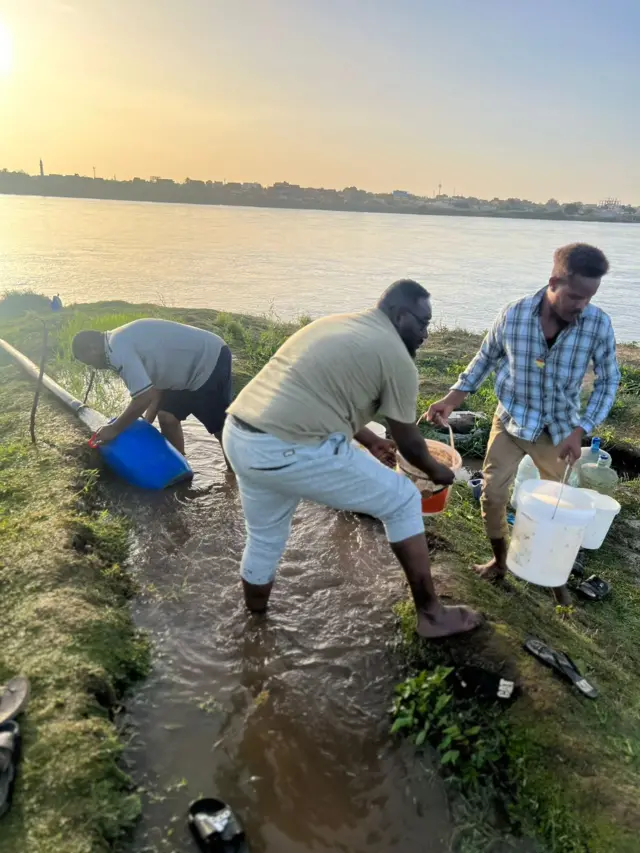 Image source, Courtesy of Bashir Hassan
Image source, Courtesy of Bashir HassanThey collect water from the River Nile
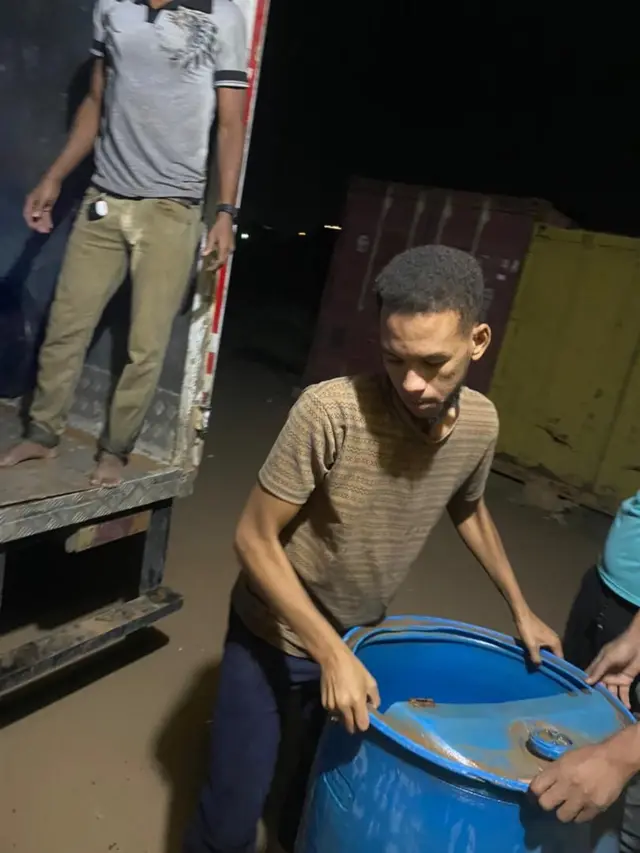 Image source, Courtesy of Bashir Hassan
Image source, Courtesy of Bashir HassanThen take it to friends and family
Analysis
 Nichola Mandil
Nichola Mandil
BBC News, Juba
As fighting continues in Sudan, despite the temporary ceasefire, neighbouring South Sudan has shown an interest in mediating peace talks between the bitter rivals – army chief Gen Abdel Fattah al-Burhan and the leader of Rapid Support Forces, Gen Mohamed Hamdan Dagalo, better known as Hemedti.
Despite South Sudan and Sudan's bitter past of a long civil war leading to secession in 2011, recently relations between the two countries have been cordial.
Ties grew stronger following the signing of the 2018 deal that ended five years of conflict in South Sudan as Sudan was one of the guarantors of the agreement.
Juba also has a history of mediating between various Sudanese rebel groups and the government led by Gen Burhan.
The two generals have been to Juba together on a number of occasions to sign peace deals with rebel groups from Sudan.
Hemedti also played a key role in mediating between South Sudan's President Salva Kiir and his former rival, Riek Machar, who is now the First Vice-President.
Now Juba is trying to reciprocate.
President Kiir understands the nature of politics in Sudan very well and is also well acquainted with the two generals.
 Alfred Lasteck
Alfred Lasteck
BBC News, Dar es Salaam
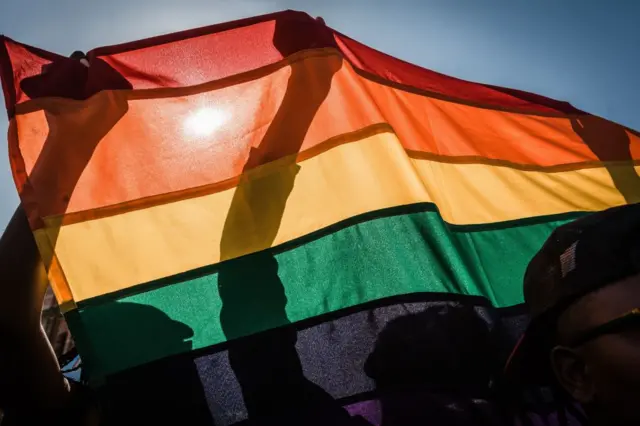 Image source, Getty Images
Image source, Getty ImagesZanzibar's government has banned the use of rainbow colours in schools because of their association with gay pride and LGBTQ rights.
Same-sex relationships are illegal in the islands, which are a semi-autonomous part of Tanzania.
"We warn schools not to use emblems and drawing with rainbow colour. Also, they should not use [the] Wimpy Kid book series because they advocate on same sex couples," says Education Minister Lela Musa.
She says 16 of those books violate the traditions, customs, and culture of Zanzibar - and has warned that exposure to rainbow colours may influence the behaviour of children.
An official says morgues are running out of space as the number of attempted crossings soars,
Read MoreEmery Makumeno
BBC News, Kinshasa
 Image source, Democratic Republic of Congo Government
Image source, Democratic Republic of Congo GovernmentIt will also contain a new recording studio
Seven years after the death of Papa Wemba, the Congolese government has finally acted on its promise.
On Friday, the arts and heritage minister officially handed over the late superstar's Kinshasa home to the Institute of National Museums of Congo, who are turning it into the house of Congolese rumba.
A recording studio will also be installed there, the ministry says.
Two years ago, Congolese rumba gained protected status when it was added to Unesco's list of Intangible Cultural Heritage of Humanity.
Known by his stage name Papa Wemba, Jules Shungu Wembadio Pene Kikumba was one of the Congolese singers who took Africa’s most influential music genre to the world from its hub, Congo-Brazzaville and the Democratic Republic of Congo.
In 2016 Papa Wemba passed away on stage while performing in Ivory Coast, after a career spanning four decades.
There's one more promise that the DR Congo's government has yet to fulfil - and that's putting up a statue in Papa Wemba's memory.
You may also be interested in:
Jennifer McLellan arrived back in Scotland with her four children but her husband remains in Sudan.
Read MoreNatasha Booty
BBC News
Some 1,600 Nigerian students are still trapped in Sudan's capital Khartoum, sheltering inside university buildings, according to the union of Nigerian students in Sudan.
"There has been no update from the Nigerian embassy since yesterday," a spokesman for the National Association of Nigerian Students in Sudan (NANSS) told the BBC on Friday.
He added that some Nigerian students had made it to the border on buses, and confirmed that a group whose driver claimed he hadn't been paid is no longer stranded in the desert.
Abike Dabiri-Erewa, the chairwoman of the Nigerians in Diaspora Commission, said on Thursday that payment issues had been resolved, external and that some Nigerian students had arrived safely across the border into Egypt, external.
The BBC has also spoken to another student who said she was relieved to arrive home safely on Thursday to northern Nigeria via Ethiopia.
Mike Thomson
BBC World Service News
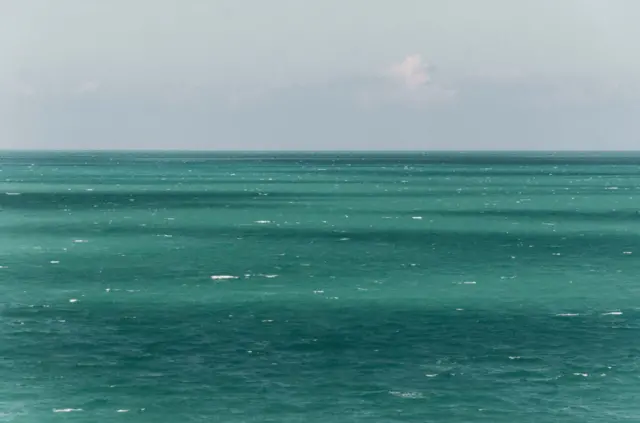 Image source, Getty Images
Image source, Getty ImagesTunisia has overtaken Libya as the main embarkation point
Coastguards have recovered the bodies of 41 migrants off the Tunisian coast.
A senior official said more than 200 people trying to reach Europe were known to have drowned in the last 10 days alone.
He added that Tunisian mortuaries were now running out of space and the authorities were struggling to contain the surge in attempted crossings.
The north African country has now taken over from neighbouring Libya as the main embarkation point for Europe-bound migrants.
The jet stream, already very dry ground and global warming are some of the forces that coincided to break April temperature records this week. Chris Fawkes explains.
Read More Will Ross
Will Ross
Africa editor, BBC World Service
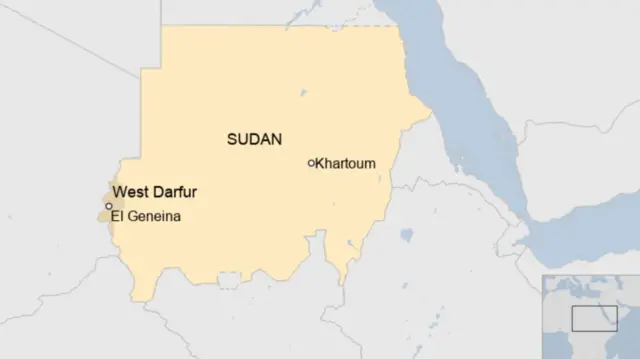
Doctors in Sudan say at least 74 people have been killed during two days of fighting this week in the Darfur region, in the west of the country.
Despite agreeing to extend a ceasefire by three days, the army and a rival paramilitary group - the Rapid Support Forces (RSF) - have been fighting each other in different parts of the country including the capital, Khartoum.
Both sides in this war are accusing each other of launching attacks. There is no ceasefire in parts of Khartoum and the western Darfur region.
There are reports that fighters have looted and torched markets, aid warehouses and banks in El Geneina.
Civilians in Darfur have long complained of being badly let down.
A UN peacekeeping force pulled out of the area two years ago leaving people vulnerable to attacks by the RSF.
Today, just as they did during the Darfur genocide two decades ago, thousands of people are fleeing for their lives across the border into Chad.
The warring sides agree to renew the truce just before it is due to end but there are doubts it can hold.
Read More DJ Edu
DJ Edu
Presenter of This Is Africa on BBC World Service
 Image source, Blue Life
Image source, Blue LifeFanicko is only the second artist from Benin after Angelique Kidjo to reach a million streams for one of his songs on YouTube.
The song in question is Faut Pas M’Embrouiller and it is typical of Fanicko, combining an infectious energy reminiscent of music from Congo and Ivory Coast, with storytelling that fans really warm to.
The lyrics implore a girl not to confuse the singer, not to mess with his mind – he’s got to focus on making money, proving to others he can make it, and providing for his mum and dad who are struggling.
But that doesn’t do it justice – if my French was better, I’m sure I’d appreciate Fanicko’s turns of phrase and the pictures he paints even more.
Fanicko’s biggest hit to date is Le Beau des Beaux. It’s about the big guys who spray their cash around, and the people who flatter them and benefit from their generosity – or is it vanity? The song’s video sees a new son-in-law fawned on by his wife’s family and dishing out the money to them as expected:
Quote MessageThe Beau des Beaux is the bank of the family, it’s him everyone relies on, so when you marry my sister, you take on the family and that’s how it is in Africa.
Quote MessageThere are other artists singing in French, and who are known internationally, but I think what makes me different is that I manage to put myself in the skin of each population.
Quote MessageI know what they want in different markets, I know what kind of music they like, what style is popular - so I do lots of styles and find myself having hits in Congo, Ivory Coast, Cameroon. And that affects what themes I sing about."
2022 was a great year for Fanicko - he went on a successful international tour and was named best artist of the year on his return to Benin.
Angelique Kidjo has proved that the sky is the limit even if you come from a small country in West Africa. Watch this space!
You can hear Fanicko on This is Africa this Saturday, on BBC World Service radio and partner stations across Africa, as well as online here: BBCworldservice.com/thisisafrica
Newsday
BBC World Service
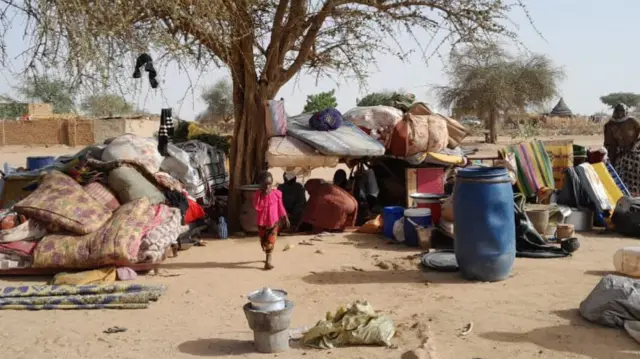 Image source, @lauralocastro4/UNCHR
Image source, @lauralocastro4/UNCHRMany Sudanese families who have fled over the border into Chad are sheltering under trees
Sudanese people flooding into a border village in Chad now outnumber its residents, a UN official has told the BBC
Some of those fleeing from fighting in Sudan's Darfur region were “literally taking all their belongings" with them, Donaig Le Du of the UN children's charity (Unicef) said.
“This little village of Koufroun is already outnumbered by the people coming in and that’s going to be a big problem because there is hardly even enough water even for the people who live there,” she told the BBC’s Newsday programme.
Ms Le Du, speaking from Chad's eastern town of Adré, said while there was no fighting along the border, people could hear the sounds of shelling coming from El Geneina city, less than 50km (30 miles) away.
She said the situation in Chad would become problematic if residents of that city started coming across.
The area has been experiencing very hot temperatures of up to 45C, with Sudanese already huddling under trees.
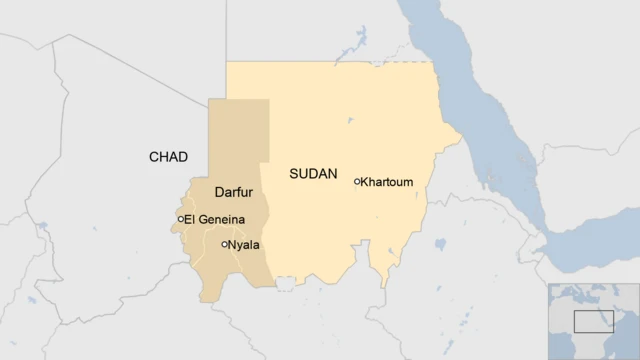
Read more about the situation in Darfur:
Alaa Sanhouri, from Leeds, says she thought she would be killed on her journey to flee the conflict.
Read MoreThirty years on from a plane crash devastated Zambian football, BBC Sport Africa hears how a Danish coach helped a nation recover from tragedy.
Read More